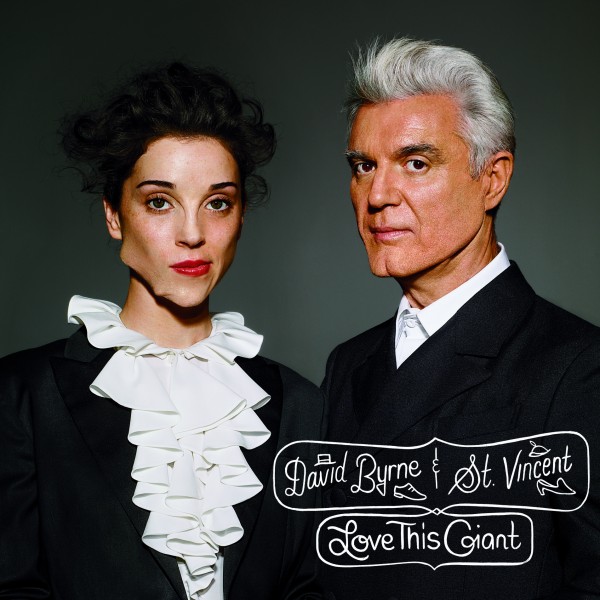A lot of collaborative projects arise from a mutual appreciation amongst their contributors. Others assume the spirit of a mentor/pupil relationship. David Byrne and Annie Clark (penname: St. Vincent) seem to be harnessing a bit of both. Though they never sought each other out (they met at Dark Was The Night), they make quite a bit of sense as a duo. There’s the grizzled veteran, whose wildly enterprising imagination has carried him on to a multitude of other artistic mediums, and the demure but fiery singer-songwriter, who is swiftly becoming a household name. There’s the inevitable wildcard factor here, but nothing on Love This Giant suggests tension or struggle. It’s surprisingly well-adjusted; a product of gentle, amicable chemistry between parties feeding off of reciprocated esteem.
The figurative thresholds that exist on the fringes of the mind are a confessed interest of Byrne’s. In his work with Talking Heads and as a solo artist, it is as much about how he was singing as what he was singing, and what extreme he was expressing. The gumption in his voice felt impossibly in sync with his words, trading on a nervous kind of energy capable of invoking empathy, elation and discomfort. Clark’s neoclassical take on stir-crazy suburban dementia lingers and haunts, offering less in the heat of the moment than Byrne’s, the Rear Window to his Psycho. Love This Giant inspires an entirely different reaction: simple appreciation. It has no genuine highlight tracks, no duds, and no perceptible deviation in composition or agreeability. It’s just soothingly, excruciatingly steady, outrageously so for two musicians known for their experimentalism.
Love This Giant was built around a horn section. Any expectations of a tirade of mountainous dueling guitars will quickly subside with lead-off track “Who.” “Who will be my Valentine/ Who will lift this heavy load,” begins Byrne rhetorically, as Clark’s austerely structured guitar lines and martial art grunts are inundated by a wobbly rhythm section. “Weekend in the Dust” is influenced in equal parts by funk, world and classical music, with sniping trumpets and Clark at her spunkiest. The classic sound in the opening minutes is very New York, and makes quick work of any wildcard factor. Byrne plays the role of bystander here, as if he’s unsure of how to initiate himself into the proceedings. It isn’t until “Dinner for Two” that he sounds confident, chipping in a blue-eyed vocal performance that adds a picturesque gravity to a song being muddily routed by an army of trumpeters.
Although the record is aesthetically consistent, there are subtle changes in its structure. There are outlandish, modestly successful experiments (“I Should Watch TV”), non-sequitur pop pieces (“Lazarus”) and lumbering ballads (“Outside of Time and Space”) all of which somehow manage to feel united under the banner of this strange partnership. It occasionally jumps out of its box, like on “Ice Age,” but never as fascinatingly as it should. The foundation here is, indisputably, the horn section, but some of the best moments arise when this aspect is toned down. The minimalist “I Am An Ape” stands out for this reason, working in kooky imagery and rattlesnake drumming without upending the individuality of the record. It’s tough to gauge the contributions of either party here, though both have stated that the writing process was democratic and split 50/50. Aside from the singing, the division of labour is ambiguous, which makes it tough to determine who isn’t pulling their weight, and when.
The lyrics are overtly heady and too reliant on in-jokes to elicit broad appeal, although there are moments when they shine. Clark contributes her finest set on “The Forest Awakes,” swooning with a melody in step with the Actor era amongst a hiccoughing drum machine and percussive trappings. And while it’s a seldom occurrence, Byrne is at his best when he’s flashing some humour: “All the beautiful people/ They did some work on your face,” he japes on “The One Who Broke Your Heart.”
Much of the writing for Love This Giant was done via email, which manifests in a manner that’s both endearing and a little frustrating; Clark and Byrne are never fully on the same page. Instead they ricochet off each other, flying off on miniaturized tangents that never stray far from home. The obtuse intellectualism of the lyrics and big band backing don’t cut it for a record that should have been less illusory and way more adventurous. That disconnect makes Love This Giant more of a carousel than a rollercoaster.

